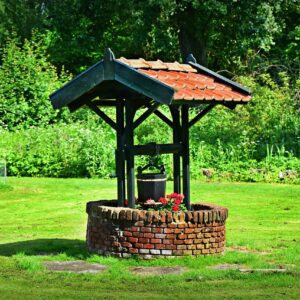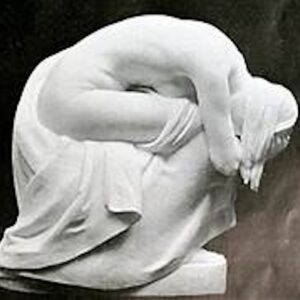My father likes to test me.
“The world is too much with us; late and soon,
Getting and spending, we lay waste our powers.”
You know who wrote that, right? he asks.
I’m his son-the-poet. Of course I recognize Wordsworth.
“The dead don’t get around / Much anymore,” the speaker in Donald Justice’s “Nostalgia and Complaint of the Grandparents” laments. A great-grandfather himself, at ninety-four my father doesn’t get around much anymore either. From the bed, with the support of his walker, he drags himself to his chair at the dining room table. From there, he lurches, an inch at a time, to his high-backed black leather armchair, falls back into its deep cushions, and reads the Philadelphia Inquirer, watches the Phillies, Turner Classics, and, when the market’s open, CNBC. Lately, however, he spends most of the day in bed.
There was an hour when daughters
Practiced arpeggios;
Their mothers, awkward and proud,
Would listen, smoothing their hose—
Sundays, half-past five!
Do you recall
How the sun used to loll,
Lazily, just beyond the roof,
We thought it would never set.
My father likes to recall the past, but unlike the grandparents in Justice’s poem he usually doesn’t wax nostalgic about the years when my brothers and I were growing up. He goes back further. He likes to tell the story of the last time he bumped into his father. His father left when he was seven. One day when my father was in his early twenties, he bumped into his father on Broad and Locust in Philly. I’ll call you when I get settled in California, his father said. My father’s still waiting for the call. He recalls his mother, a divorced, single mother in the 1930s, who worked her way up from department store saleswoman to owner of an exclusive women’s wear shop on Philly’s Main Line. He recalls living in Cleveland with one of his aunts on his mother’s side so he could attend Western Reserve University. And he especially likes to recall Central High School, an elite boys’ school, from which he graduated in January 1945, a member of the 183rd class. Central High: that must be where he committed a bunch of poems to memory. He’s more story than body now.
I have no idea what poetry means to my father. In their modest apartment, he and my mother have a little shelf where they keep copies of my books. Along with my books, they have copies of Stephen Dunn’s Local Time and Donald Justice’s Selected Poems. Stephen and Don were my teachers. I don’t know if either of my parents have read any of their poems. I don’t know if they even remember the books are still there. My father never makes it as far as the guest room where the books are kept. My mother, if she does stumble across Dunn and Justice once in a while—maybe while dusting—probably just remembers that I was fortunate enough to study with those two great poets.
“My father doesn’t get around much anymore.” In an earlier draft of this post, my sentence came before Justice’s lines. The moment I typed it, I recalled Justice’s lines. The lines had been waiting in me for an occasion on which to speak again. I listened to them and turned back to the poem in which they live, “Nostalgia and Complaint of the Grandparents.” “Nostalgia and Complaint” holds in it the voice of Jules Laforgue’s “Complaint About Forgetting the Dead,” an epigraph from which begins Justice’s poem:
Les morts C’est sous terre; Ça n’en sort Guère.
My father was born in 1927, two years after Justice. Both grew up during the Depression. But when my father recalls those years, it’s not with the same tone as the grandparents in Justice’s poem who speak, well, nostalgically of that time:
…where are they now, All the sad squalors Of those between-wars parlors?—
There were no “parlors” in my father’s childhood. And though there may have been some “squalor” in his living circumstances—he’s told us repeatedly about the shirt cardboard in his shoes when the soles had worn through—he speaks almost fondly, almost proudly of his life back then.
The grandparents’ complaint?
Children, have you nothing For our cold sakes? No tea? No little cakes? Sometimes now the rains disturb Even our remote suburb. There’s a dampness underground. The dead don’t get around Much anymore.
Ugly day, my father says when, looking out the window from his chair in the suburbs, he sees rain. But he never complains about his children, his grandchildren. As much as he loves his past, he loves his family. If for no other reason than to be with them, he wants to hang around, despite his failing body, for a few more days, maybe another year or two.
Justice’s lines live within me just as Wordsworth’s lines live within my father. Maybe the lines have stuck with him as a kind of warning, a warning he wants to pass along to us: don’t waste your life getting and spending. He’s earned a good enough living and provided well for his family. But material wealth—he’s never been driven to accumulate that. His life hasn’t been defined by what he’s gotten and what he’s spent. So, maybe more than just an indication of his good education, the lines speak to and for my father.
But what about the rest of the poem? Does he remember it? Does it speak to him, for him, through him?
The world is too much with us; late and soon, Getting and spending, we lay waste our powers;— Little we see in Nature that is ours; We have given our hearts away, a sordid boon! This Sea that bares her bosom to the moon; The winds that will be howling at all hours, And are up-gathered now like sleeping flowers; For this, for everything, we are out of tune; It moves us not. Great God! I’d rather be A Pagan suckled in a creed outworn; So might I, standing on this pleasant lea, Have glimpses that would make me less forlorn; Have sight of Proteus rising from the sea; Or hear old Triton blow his wreathèd horn.
It’s hard for me to imagine that if he ever feels himself out of tune with the world in which he lives that he’d find alignment by turning to the sea, the winds, the lea—the man whose acknowledgement of nature, as far as I can recall, is limited to ugly day or beautiful day.
A line or two here or there sticks. Who, finally, knows why these lines and not others. Who when those lines that live deep inside us will speak again? That a little bit of poetry has stayed with my father throughout his life is just enough for me. The dead may not get around much anymore, but Wordsworth still gets around a bit in my father. When he’s gone, I’ll be waiting for his call, Wordsworth’s lines spoken in his voice, not testing me but simply saying, I’m here with you, I’m here with you, I’m still here.
Richard Chess directed the Center for Jewish Studies at UNC Asheville for 30 years. He helps lead UNC Asheville’s contemplative inquiry initiative. He is a board member for the Center for Contemplative Mind in Society. He’s published four books of poetry, the most recent of which is Love Nailed to the Doorpost. You can find him at http://www.richardchess.com





